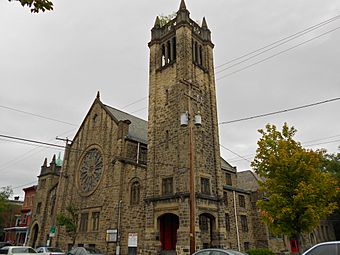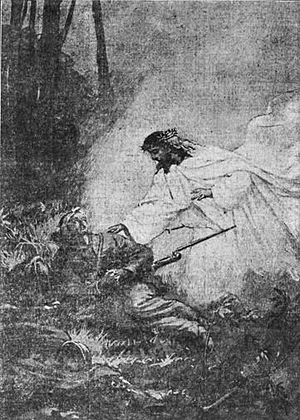Camp Curtin Memorial Methodist Episcopal Church facts for kids
Quick facts for kids |
|
|
Camp Curtin Memorial Methodist Episcopal Church
|
|

Camp Curtin Memorial Methodist Episcopal Church, c. 2010
|
|
| Location | 2221 N Sixth St., Harrisburg, Pennsylvania |
|---|---|
| Area | less than one acre |
| Built | 1895, 1916 |
| Architect | Badgley, Sidney R.; Hamilton, Thomas; Savage, George E.; Sollenberger, C.A. |
| Architectural style | Late Victorian, Romanesque |
| NRHP reference No. | 10000400 |
| Added to NRHP | August 5, 2010 |
The Camp Curtin Memorial Methodist Episcopal Church is a historic church building in Harrisburg, Pennsylvania. It is also known by other names, like Curtin Heights Church. This church is a special place because it was added to the National Register of Historic Places in 2010. This means it is recognized as an important historical site.
In recent years, there have been discussions about the church's future. In December 2018, the United Methodist Church group that oversees it announced plans to combine or sell about 10 churches in the Harrisburg area. In February 2021, news reports said the church might be sold to a group planning a veterans' ministry. However, that deal did not happen, and the church was put back up for sale. It was listed for $155,000 and could be used for different purposes because of its commercial neighborhood zoning.
Contents
Church History
Early Beginnings (1889-1894)
The story of this church began in February 1889. Eight people in Harrisburg formed a Methodist group. Soon after, on May 12, 1889, they started a Sunday school. About 50 people regularly attended classes in a room above a grocery store. As more people joined, the group needed a bigger space. Reverend J.S. Wilcox led the effort to build a new chapel. The first stone for this new building was placed on May 11, 1890. The chapel, called Curtin Heights Episcopal Church, was officially opened in December 1891. It was built on the site of Camp Curtin, a very important training camp for soldiers during the American Civil War.
Building and Rebuilding (1893-1895)
The church grew quickly, so two new sections were added to the chapel in 1893. However, this expanded building did not last long. A fire destroyed it on December 30, 1894. But the church members did not give up! They built a brand new church on the same spot. This new building was finished in July 1895, thanks to the leadership of Dr. S. Fasick. It was formally dedicated on December 15 of that same year.
New Name and Expansion (1914-1916)
The church's name officially changed in September 1914. It became the Camp Curtin Memorial Methodist Episcopal Church. Later that year, church leaders decided to expand the church even more. They raised $38,000 for this project. The church was rededicated as a memorial to all soldiers who fought in the Civil War.
In 1915, the church's pastor, Rev. Alvin S. Williams, encouraged more expansion. Another $60,000 was raised. On December 3, 1916, construction began for a new sanctuary and auditorium. This new space could seat 700 people.
That same year, a special painting was ordered for the church. It showed Christ appearing to a dying soldier. C. Day Rudy, who had lost his parents in the Civil War, was chosen to create this artwork. It was dedicated on Memorial Day weekend, May 30, 1916. Rudy also designed the beautiful stained glass Rose Window that is still in the church today.
Remembering Camp Curtin (1916)
In June 1916, church members asked the Pennsylvania Legislature to put up a monument near the church. They wanted to remember that the church stood on the historic site of Camp Curtin. Their request said:
"We, the undersigned, citizens of Harrisburg, Pa., ... respectfully petition thee coming session of the State Legislature to procure the vacant plot of land located between Camp Curtin school building and the Camp Curtin Memorial Church on Sixth Street, Harrisburg, Pa., as a site for the erection of a worthy recognition in monument or if desired a statue.... We also ask the cooperation of all public officeholders of Harrisburg and Dauphin county and all patriotic societies and all political parties to help us in thus honoring the memory of our great War Governor and the 100,000 soldiers who, in the days of '61 and '65, went forth from old Camp Curtin to preserve the union."
This petition asked for a monument to honor the governor and the 100,000 soldiers who trained at Camp Curtin during the Civil War.
Dedication Events (December 1916)
Starting on December 3, 1916, the church held a week of dedication events. Important leaders from the Methodist Church, like Bishop W. F. McDowell, spoke at the opening. On December 6, Civil War veterans and their descendants attended a special patriotic service. This service was held to dedicate the new $60,000 church building. It was seen as a monument to Camp Curtin, where 300,000 men joined the Union army.
The veterans marched to the church together. Local groups like the Grand Army of the Republic (G.A.R.) gave an American flag to the church leaders. Professor Leon C. Prince from Dickinson College gave a speech about Camp Curtin's important role in the war. After a song, everyone enjoyed bean soup in the church's social room. The dedication events ended on Sunday, December 10, with a sermon by Bishop William Burt.
Later Years and Mergers (1917-1989)
In 1917, the church hosted a performance of Handel's Messiah. Two years later, William R. Stonesifer became the church's organist and choir director.
The church's name changed again in 1939. This happened when the three main branches of the Methodist church joined together. It became the Camp Curtin Memorial Methodist Church. In 1969, the Methodist church merged with the Evangelical United Brethren Church. The church's name then changed to Camp Curtin Memorial United Methodist Church. Finally, on June 25, 1989, this church joined with Mitchell United Methodist. This created the church known today as Camp Curtin Memorial-Mitchell United Methodist Church.
Church Design
The Camp Curtin Memorial Methodist Episcopal Church is built with strong materials. It has a stone front made of buff Holmesburg granite over brick. Its style is called Late Victorian and Romanesque. Inside the main church building, there is one of the largest pipe organs in Harrisburg. It was designed and installed in 1917.
The back part of the church was built first, in 1895. This was the main worship area for the congregation. Later, in the fall of 1915, the first stone was laid for a new, larger sanctuary. This front section of the church was finished in 1916. It features a tall tower and a belfry with decorative tops. This church was added to the National Register of Historic Places in 2010.
Current Situation
In December 2018, the United Methodist Church group announced plans to combine or sell about 10 churches in the Harrisburg area. In February 2021, news reports said the Camp Curtin Memorial-Mitchell United Methodist Church would be sold. The plan was for a church from the west coast to buy it for a veterans' ministry. However, the deal did not go through, and the church was put back on the market a month later. The listing said the property was 15,852 square feet and listed for $155,000. It was zoned for "commercial neighborhood," meaning it could be used for different things.
Since the announcement, the plan to sell these churches has faced opposition. People who want to protect historical buildings and members of the churches have spoken out. Claude Phipps, a leader at another church, said that these churches help keep minority neighborhoods strong. He felt that closing them would remove an important support system.
Rhonda Mays, a member of the Camp Curtin Memorial-Mitchell preservation committee, explained that the church's true impact is felt throughout the week. Even though about 40 people attend services, the church offers many social services to the community. These include health care services and a very important soup kitchen. David Morrison, from the Historic Harrisburg Association, added that the church is a landmark. He said its value for history, tourism, and teaching about the Civil War is very important.
More to Explore
- Camp Curtin: Learn about the Union Army's Civil War training camp.
- Camp Curtin Fire Station: Discover the historic fire station in Harrisburg.
- Camp Curtin, Harrisburg, Pennsylvania: Find out more about the Camp Curtin neighborhood.
- Harrisburg School District: Information about schools, including Camp Curtin School.




